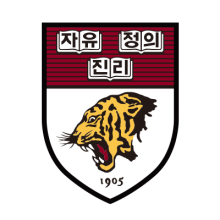
Korea University
About Korea University
Korea University, founded in 1905, is widely acknowledged as one of the country’s oldest, largest and top-ranked universities in Korea. Its reputation for quality is based on excellence in teaching, research and service to Korean society. Eminent faculty, outstanding students and internationally recognized research programs all contribute to Korea University’s academic fame. As a major comprehensive university, KU offers a rich variety of courses in liberal arts and sciences as well as in all professional fields, including law, medicine and business administration.
Korea University is also a leader in the development of international education programs. Having KU global campuses located around the world has allowed KU to leverage key partnerships for student exchanges as well as special educational experiences. In addition to sending over 1,200 students abroad each year on student exchanges, KU welcomes 4,500 international students consisting of short-term visiting students as well as 2,000 degree-seeking students.
KU is nationally recognized for its commitment to teaching and academic excellence. The university’s academic breadth is extensive with its 81 departments in 22 colleges and divisions, and 23 graduate schools and it has over 1,700 full-time faculty members with over 95% of them holding Ph.D. or equivalent qualification in their field. KU has particularly strong
Humanities and Asian Studies Departments along with the Graduate School of International Studies(GSIS). KU is also renowned for its professional schools of Law, Medicine and Business Administration.
In research, KU is an internationally recognized leader with over 140 research centers, including the East Asiatic Research Centre and the Korean Cultural Research Centre. Furthermore, Korea University Business School (KUBS) was the first business school in the country to have acquired both European Quality Improvement System (EQUIS) accreditation, in combination with the accreditation granted by the Association to Advance Collegiate Schools of Business (AACSB).
Unlike many universities in Korea, KU prides itself not only in being a progressive and globally conscious institution but one that plays a role in preserving and developing Korea’s unique culture.
Explore rankings data for Korea University
Subjects taught at Korea University
Engineering & technology
- Electrical & Electronic Engineering
- General Engineering
- Civil Engineering
- Chemical Engineering
- Mechanical & Aerospace Engineering
Social sciences
- Politics & International Studies (incl Development Studies)
- Geography
- Sociology
- Communication & Media Studies
Arts & humanities
- Art, Performing Arts & Design
- History, Philosophy & Theology
- Languages, Literature & Linguistics
- Architecture
- Archaeology
Business & economics
- Economics & Econometrics
- Accounting & Finance
- Business & Management
Computer science
- Computer Science
Physical sciences
- Mathematics & Statistics
- Chemistry
- Geology, Environmental, Earth & Marine Sciences
- Physics & Astronomy
Clinical, pre-clinical & health
- Other Health
- Medicine & Dentistry
Education
- Education
Life sciences
- Biological Sciences
- Agriculture & Forestry
Law
- Law
Psychology
- Psychology
Key statistics
- 16.3No. of students per staff(1)
- 31%Percentage of International Students(1)
- 22,324Number of FTE Students(1)
- 27%Proportion of ISR Publication(1)
- 46 : 54Student Ratio of Females to Males(2)
Video





